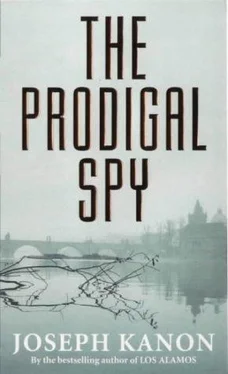The draft in the hall seeped through his thin pajamas, making him shiver. He felt like leaping into bed, pulling the covers over his head, and curling his body into a ball, as warm as the cabin fire. Instead he went down the hall to his parents’ room. The bedside lamps were on, surrounded by piles of books and Kleenex and alarm clocks. He walked over to his father’s dressing area, a mirror and a tall row of built-in drawers that pulled out on smooth, quiet runners, not like Nick’s, which always stuck. All the shirts were white, stacked in two neat piles. He took one out. Garfinkel’s, all right. But the tag under the laundry mark was 15?-35. Just as he’d said. Nick almost grinned in relief. The next one was the same, and suddenly he caught sight of his pajamas in the mirror and felt ashamed. This wasn’t playing the spy game with Nora; it was wrong, like being a burglar. What if his father noticed?
Nick put back the shirts and evened out the edge of the pile. But he’d already started-why not know for sure? Carefully he flipped through the collars of the shirts, looking for the size tags. Some weren’t even Garfinkel’s. Then, halfway down, he found it. A Garfinkel label, 15?-33. He stared at it, not moving, his finger barely touching the tag. Why had he kept it? Maybe it was a mistake, a present from Nick’s mother. But that wouldn’t matter. Uncle Larry said nothing was innocent now. They’d find it, just as Nick had. There was a laundry mark, too-he’d worn it. Nick tried to think what that meant. No fingerprints. That woman, any trace of her, had been washed away. And all the shirts looked alike. But what if they had other ways? As long as it was here-
He heard the front door slam, voices downstairs saying goodbye, and without thinking snatched the shirt, closed the drawer quietly, and ran back to his room. He looked around for a hiding place, but then the voices seemed to be coming up the stairs so he shoved it under his pillow and got into bed, breathing fast. Outside the snow had finally begun, blowing almost horizontally across the light from the street lamp. When his mother peeked in through the door, he shut his eyes, pretending to be asleep. He kept them closed as she crossed the room to tuck him in. For a second he was afraid she would fluff his pillow, but she only kissed his forehead and drifted away again in a faint trail of perfume.
Tomorrow he would find someplace to get rid of it-a trash can, not too near the house-and then his father would be safe again. Then he thought of the laundry mark. He’d have to cut that out. No trace. He turned on his side and put one hand under the pillow, anchoring the shirt. He tried to imagine himself at the cabin again, snug, but the room stayed cold and awake, as if someone had left a window open. His grandmother once told him that people in Europe thought the night air was poison, so they sealed everything tight. But now it came in anyway, blowing through the cracks, making his thoughts dart like flurries, poisoning shelter.
His father was wrong about one thing: Welles did have to delay the hearing. The next day, a Friday, snow covered Washington in a white silence, trapping congressmen in Chevy Chase, swirling around Capitol Hill until the dome looked like an igloo poking through the drifts. In the streets nothing moved but the plows and a few impatient cars, their heavy snow chains clanking like Marley’s ghost. By midmorning everyone on Nick’s block began digging out, a holiday party of scraping shovels and the grind of cars spinning wheels in deepening ruts. Nick’s father helped the other men spread ashes around the tires, then push from behind until the cars lurched into the street, shuddering with exhaust. At the curbs, snow was piled into mounds, perfect for jumping. Even Mrs Bryant next door came out, tramping up and down the street in her galoshes and mink coat, dispensing cups of chocolate, mistress to the field hands. Afterward Nick and his father knocked the heavy snow off the magnolias with brooms to save the branches, and it fell on their heads, seeping under their collars until they were finally forced inside to dry out. They had soup beside the fire, the way they did at the cabin, and Nick hoped the snow would never stop. The shirt, stuffed now behind a row of books, could wait.
“They’ll cancel the dance,” his mother said, glancing out the window. “Poor old Miriam. Her first year as chairwoman, too.” She giggled. “What do they do with the flowers, do you think? God, she’ll be furious.”
“It’ll be gone by tomorrow night,” his father said. “Anyway, a little snow won’t stop her. She can fly in on her broom.” This to Nick, who laughed.
“Walter.”
“It snowed last year too, remember?”
“Yes, and half the people didn’t show. Poor Miriam.”
Nick leaned back against the club chair hassock, warm from the fire, and watched his parents. It was the sort of easy conversation they used to have, before the troubles. Her new dress. Where the United Charities money went anyway. Whether the President would come this year. When the phone rang it jolted him, as if he’d been half asleep.
His father had barely said ‘Hello’ before his expression changed. He glanced up at Nick’s mother, then, seeing Nick, retreated to a series of noncommittal ‘Yes’ and ’I see’s. When the call was finished, he went up to the study without saying a word. Nick could hear him dialing, then the low tones of another conversation. His mother, nervous again, followed him, standing outside the study door with her hand against the frame, braced for bad news. Then she went in, closing the door behind her so their voices were no louder than the muffled sounds in the street.
Nick knew they were not going to tell him, whatever it was, and he wondered in a kind of quiet panic whether he’d waited too long to get rid of the shirt. The storm had lulled him into thinking there was time, but now it was starting again. He got up from the floor and headed out into the hall, grabbing his winter jacket from the closet before racing up to his room. The shirt was still there, folded behind the books, and he stuffed it under his sweater, then put on the jacket, buckling the belt to keep the shirt from falling out. His boots were in the back mud room, drying out, so he’d have to go that way, through the kitchen.
“And where might you be going?” Nora said when she saw him.
But he was prepared. “The hill. With the sled. Mom said I could.”
“And your boots still wet.”
“I don’t care. Everybody’ll be there,” he said, pulling them on in a rush.
“Who’s everybody?”
But Nick was already opening the back door. “Everybody.”
And then he was free, crossing the back alley courtyard, where all the garages were. The snow was deep here-no one had bothered to shovel in back yet-and it took him a minute or two to reach the garage and find the sled, crammed in a corner with rakes and shovels. Any moment now his mother might appear at the window, calling him back. But she didn’t, and after he turned the corner into the alley, he knew it was going to be all right.
The problem was where to dump it. The snow had covered the trash cans along with everything else. He couldn’t just bury it in the snow. They’d find it after the melt, like a body. A mailbox would be ideal, but his father had told him it was illegal to put things there. Somebody would report it. Pulling the sled behind him, he walked as far as Massachusetts Avenue, where the plows had been. But it was crowded here, store owners shoveling sidewalks, people carrying paper bags of groceries, so he turned onto A Street, back toward the Capitol.
He had gone two more blocks before he saw it-a storm drain at the curb that hadn’t been blocked by snow. He looked around, then knelt down, fishing the shirt out from under his jacket. The label. He took off his gloves and ripped off the black tag, his fingers surprised by the cold, then stuffed the shirt into the space behind the grate, pushing it with his bare hands until it fell with a quiet thud into the drain. He stood up and looked around to see if anyone had noticed, but the street was still empty. He remembered then that he hadn’t cut out the laundry mark, but it was too late. And maybe it wouldn’t matter. The sun would melt the snow and the drains would run, carrying the shirt along their underground tunnels until they emptied into the Potomac, or wherever they went, miles from the committee room. When he reached the Capitol a few blocks later, making a circle, he felt happier than he’d been in days. Somebody had finally helped.
Читать дальше












